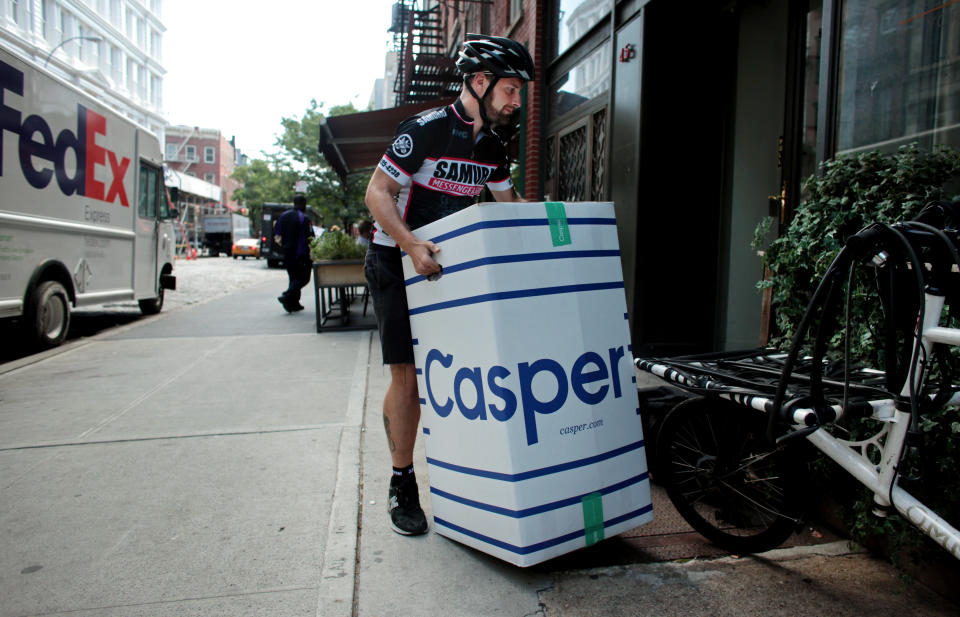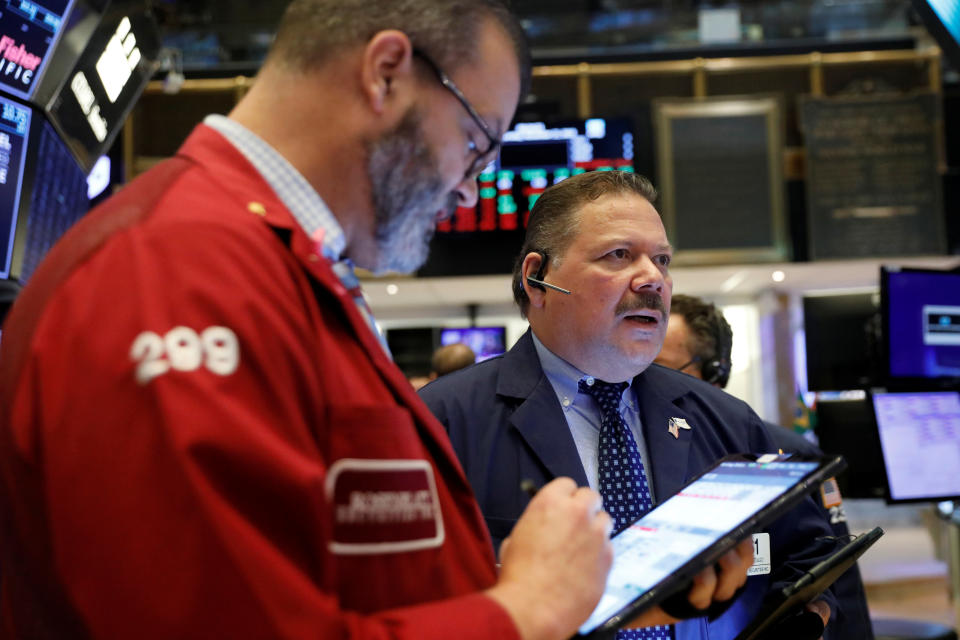Stock market news live: Stocks close lower as coronavirus death toll rises
Global equity markets slumped Monday as fears over the deadly coronavirus flared further. At its lows of the day, the Dow Jones Industrial Average was down 549 points, or 1.9%.
The sell-off kicked off a busy week for potentially market-moving earnings and economic data releases – including U.S. fourth-quarter GDP and a Federal Reserve rate decision – on a volatile note.
Here’s a look at what’s moving markets on Tuesday, January 28.
—
4:02 p.m. ET: S&P 500 falls 1.57%, biggest single-day drop since Oct. 2 as coronavirus death toll rises
The S&P 500 fell 1.57% Monday in the index’s biggest single-day drop since October 2 as the death toll from coronavirus continues to rise.
Here’s where the major indices were as of 4:02 p.m. ET:
S&P 500 (^GSPC): -1.58% or -52.20 points to 3,243.27
Dow (^DJI): -1.58% or -459.09 points to 28,530.64
Nasdaq (^IXIC): -1.89% or -175.60 points to 9,139.31
Crude oil (CL=F): -2.25% or -1.22 to 52.97 a barrel
Gold (GC=F): +0.62% or +9.70 to 1,581.60 per ounce
—
3:17 p.m. ET: New York sues ‘Pharma Bro’ Martin Shkreli for stifling competition
New York Attorney General Letitia James has filed a lawsuit with the FTC against Vyera Pharmaceuticals and two of its former CEOs, including Martin Shkreli for stifling competition to protect drug pricing.
The lawsuit revolves around Vyera’s toxoplasmosis drug Daraprim (pyrimethamine). According to the lawsuit, “Vyera purchased the drug, increased the price, altered its distribution, and engaged in other conduct to delay and impede generic competition.”
“Martin Shkreli and Vyera not only enriched themselves by despicably jacking up the price of this life-saving medication by 4,000 percent in a single day, but held this critical drug hostage from patients and competitors as they illegally sought to maintain their monopoly,” said Attorney General James in the release.

—
3:09 p.m. ET: Boeing lands more than $12 billion in funding as 737 Max woes continue, CBNC reports
Boeing (BA) reportedly secured more funding than it had initially been seeking to help finance its turnaround efforts in the fall-out from its near year-long grounding of its 737 Max aircraft.
The aircraft maker secured more than $12 billion from more than a dozen banks after having sought a loan of $10 billion, CNBC reported Monday, citing unnamed people familiar with the matter.
Boeing is poised to reported quarterly earnings after market open on Wednesday, during which it is expected to detail its costs in compensating customers and suppliers as a result of the aircraft groundings and recent production halt.
—
2:47 p.m. ET: Crude oil prices fall to three-month low
U.S. West Texas intermediate crude oil prices (CL=F) sank to the lowest level since mid-October as of Monday’s settlement. The commodity ended the session lower by 1.9% to $53.14 per barrel, marking its fifth consecutive session of losses.
March futures for ICE Brent crude (BZ=F), the international benchmark, dropped more than 2% to $59.32 per barrel at settlement.
Commodity prices continue to be hit by the coronavirus fears, given that the disease’s concentration in China threatens to dampen demand in one of the world’s largest energy and raw materials consumption centers.
—
2:31 p.m. ET: Underperforming cyclical sector earnings appear to be rebounding sharply
Companies comprising some of the weakest sectors in 2019 are making a comeback based on fourth-quarter earnings results to date, according to an analysis from UBS. This, in turn, could help drive faster earnings growth in aggregate for the S&P 500 this year as this trend continues.
Here’s what David Lefkowitz, UBS senior equity strategist, had to say:
While it is still somewhat early in 4Q earnings season, evidence is mounting that the outlook is improving. Specifically, select companies in a few of the weaker sectors in 2019 appear to have turned the corner. The positive inflection is very clear in semiconductors. Earnings in this industry group contracted by more than 20% in 2019. Based on blowout 4Q numbers from Intel, and constructive comments from Texas Instruments, this industry group will grow in 2020, perhaps by double digits. Similarly, earnings and commentary from the US rails suggest that volume trends will improve over the course of the year.
UBS expects 2020 S&P 500 earnings growth of 6%, picking up from just a 1% gain in 2019.
—
1:42 p.m. ET: FCC certifies Google and Sony to use 3.5GHz band for 5G
Google, Sony, CommScope, and Federated Wireless are now certified to use the 5.55-3.7 GHz band, commonly called the 3.5 GHz band, for 5G and broadband, the FCC announced.
—
1:03 p.m. ET: Stocks come back from the lows of the session, but still hold lower
Stocks pared some losses, but the three major indices were each still off by more than 1% during intraday trading. The energy sector led declines in the S&P 500, with domestic crude oil prices down nearly 3%.
Here were the main moves in markets, as of 1:08 p.m. ET:
S&P 500 (^GSPC): -1.27% or -41.92 points to 3,253.55
Dow (^DJI): -1.24% or -360.02 points to 28,629.71
Nasdaq (^IXIC): -1.59% or -148.78 points to 9,166.07
Crude oil (CL=F): -2.73% or -$1.48 to $52.71 a barrel
Gold (GC=F): +0.47% or +$7.40 to $1,579.30 per ounce
—
1:03 p.m. ET: What to know about the coronavirus outbreak
As fears over the spread of the coronavirus continue to mount, Yahoo Finance is tracking the latest developments on the outbreak’s impact on the markets and global economy. To date, the virus has been confirmed in 14 locations, including five cases in the U.S.
—
11:30 a.m. ET: Casper’s lowers expectations for upcoming IPO

According to a regulatory filing, online mattress retailer Casper is seeking to raise $159 million in its initial public offering, with an estimated range of $17-19 per share.
Bloomberg notes that amount would value the company near $774 million, a substantial discount to its previous estimates of $1.1 billion, and a reflection of the brutal treatment unicorns have received at the hands of fickle investors.
—
11:00 a.m. ET: Stocks on track for biggest one-day drop of the year
The three major U.S. equity indices held lower as the trading session rolled on. The S&P 500, down some 1.5%, was on pace for its biggest one-day decline since at least October 8, when the blue-chip index settled lower by 1.56%.
Declines in the 30-stock Dow were led by shares of American Express (AXP) and Intel (INTC). The losses briefly dragged the index into negative territory for the year-to-date at the lows of the session.
Here were the main moves in markets, as of 11:00 a.m. ET:
S&P 500 (^GSPC): -1.53% or -50.53 points to 3,244.94
Dow (^DJI): -1.53% or -443.58 points to 28,546.15
Nasdaq (^IXIC): -1.9% or -177.42 points to 9,137.90
Crude oil (CL=F): -2.16% or -$1.17 to $53.02 a barrel
Gold (GC=F): +0.66% or +$10.30 to $1,582.20 per ounce
—
10:17 a.m. ET: Drug developer stocks surge as coronavirus cases rise
Shares of U.S. drug-makers including NanoViricides (NNVC), Inovio Pharmaceuticals (INO), Novavax (NVAX) and Moderna (MRNA) each jumped as trader considered the impact developments by these companies could have in stemming the spread of the coronavirus.
NanoViricides is a researcher of therapies for viruses including bird flu and HIV. Inovio, Novavax and Moderna have each said they were working on developing coronavirus vaccines. The Coalition for Epidemic Preparedness Innovations had said last week that it would grant funding to Inovio and Moderna for their coronavirus vaccine work.
—
10:00 a.m. ET: New home sales unexpectedly decline in December
Sales of new homes unexpectedly fell by 0.4% to a seasonally adjusted annual rate of 694,000 in December, according to the Census Bureau. Consensus economists had expected new home sales to rise 1.5% over last month to 730,000, according to Bloomberg data.
Each of the West and Midwest regions saw new-home sales rise between November and December. The South, however, saw sales slow to a seasonally adjusted annual rate of 347,000, down from 410,000 in November. New home sales in the Northeast also slowed modestly.
November’s new home sales were downwardly revised to reflect a decline of 1.1% to a seasonally adjusted annual rate of 697,000, versus a rise to 719,000 previously reported.
—
9:44 a.m. ET: ‘Investors are selling first and asking questions later’
Though rising concerns over the coronavirus are hammering global risk assets at the start of this week, many experts are suggesting the impact to markets will fade.
“Investors are selling first and asking questions later,” Chris Zaccarelli, chief investment officer for Independent Advisor Alliance, said in an email. “The Chinese economy – and possibly the world economy – will take a hit in the short run and lower prices are a rational response to the increasing spread of the coronavirus.”
“However, over the medium term this will likely prove to be a buying opportunity – just not at the very beginning of the outbreak,” he added. “To use SARS as an example, during the 5-month period starting in mid-November 2002 until mid-March 2003, the S&P 500 dropped 12% before bottoming and then finishing that year 19% higher than where it started.”
A similar phenomenon occurred in 1997 amid an outbreak of avian influenza in Hong Kong. That year, the S&P 500 rose 31%.
“The spread of the Wuhan coronavirus has been a big theme so far this year, but investors should be wary of over-extrapolating its implications for financial assets,” Glenmede strategists Jason Pride and Michael Reynolds wrote in a note . “In fact, markets have largely shrugged off epidemic scares in the past.”
—
9:31 a.m. ET: U.S. stocks open sharply lower amid coronavirus fears
The S&P 500, Dow and Nasdaq sank Monday morning as mounting fears over the deadly coronavirus sent risk assets reeling.
Tech and energy stocks led declines in the S&P 500, with West Texas intermediate crude oil prices down 2.5% to extend last week’s declines. Airline and cruise line stocks including Delta (DAL), American Airlines (AAL) and Royal Caribbean (RCL) each extended losses from early trading.
Here were the main moves in markets, as of 9:31 a.m. ET:
S&P 500 (^GSPC): -1.6% or -52.7 points to 3,242.77
Dow (^DJI): -1.54% or -447.3 points to 28,542.43
Nasdaq (^IXIC): -2.13% or -198.8 points to 9,116.49
Crude oil (CL=F): -2.51% or -$1.36 to $52.83 a barrel
Gold (GC=F): +0.73% or +$11.40 to $1,583.30 per ounce
—
7:40 a.m. ET: Rising coronavirus death toll sparks global equity sell-off
Contracts on the three major U.S. stock indices were each off by more than 1% in early trading as a rising number of confirmed cases of the deadly coronavirus sent global markets reeling.
At least 80 deaths have been attributed to the coronavirus to date, according to China’s National Health Commission. Each of these deaths took place in China, where a total of 2,744 cases have so far been confirmed and nearly 6,000 more suspected cases were being monitored. The U.S. has had five confirmed cases to date of the virus.
Overseas, Japan’s Nikkei index, the U.K.’s FTSE 100 and German DAX were each off by more than 2% Monday morning New York time. Companies in the travel sector including airlines and lodging services were hit amid fears that the disease would slow global travel. Luxury goods companies and commodity stocks also declined sharply, given China’s position as the world’s largest luxury goods market and a major demand center for raw materials, respectively.
Stock exchanges in Hong Kong, China, South Korea and Australia are all closed Monday in observance of holidays.
Here were the main moves during the pre-market session, as of 7:40 a.m. ET:
S&P futures (ES=F): 3,252.00, down 41.5 points or 1.26%
Dow futures (YM=F): 28,555.00, down 378 points or 1.31%
Nasdaq futures (NQ=F): 8,995.5, down 149 points or 1.63%
Crude oil (CL=F): $52.81 per barrel, down $1.38 or 2.55%
Gold (GC=F): $1,580.80 per ounce, up $8.90 or 0.57%

—
Follow Yahoo Finance on Twitter, Facebook, Instagram, Flipboard, LinkedIn, and reddit.
Find live stock market quotes and the latest business and finance news